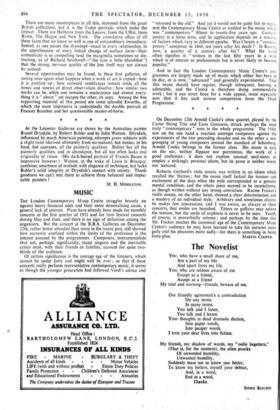MUSIC
DIE London Contemporary Music Centre struggles bravely on against heavy financial odds and their more demoralising cause, a general lack of interest. Plans have already been made for monthly concerts in the first quarter of 1951 and for four festival concerts during May and June, and there is no sign of defeatism among the organisers. But the concert at the R.B.A. Galleries on December 12th, rather better attended than some in the recent past, still showed how narrowly confined within the limits of the profession is the interest aroused by the programmes. Composers, instrumentalists (but not, perhaps, significantly, many singers) and the inevitable critics must, with their friends or families, account for quite two- thirds of the audience.
Of certain significance is the average age of the listeners, which cannot be under forty and might well be over ; so that if these concerts really perform representative contemporary music, it seems as though the younger generation had followed Verdi's advice and "returned to the old." And yet it would not be quite fair to repre- sent the Contemporary Music Centre as wedded to the music which I was " contemporary " fifteen to twenty-five years ago. Contem- porary is a loose term, and its application depends on a number of factors which vary in different epochs. Was Chopin a " contem- porary " composer in 1860, ten years after his death ? Is Busoni, now, a quarter of a century after his ? What the word often signifies is "written in the last fifty years in a style which is of interest to professionals but is never likely to become popular."
And in fact the London Contemporary Music Centre's pro- grammes are largely made up of music which either has been in its day, or is now, " advanced " and generally experimental. That this music should have regular, though infrequent, hearing is admirable, and the Centre is therefore doing commendable work ; but it can never hope for a wide appeal, more especially now that it has such serious competition from the Third Programme.
On December 12th Arnold Cooke's oboe quartet, played by the Carter String Trio and Leon Goossens, struck perhaps the most truly " contemporary 7 note in the whole programme. The 1940s saw on the one hand a reaction amongst composers against the experiments of the two preceding decades and on the other a new grouping of young composers around the standard of Schonberg. Arnold Cooke belongs to the former class. His music is easy on the ear, neither flippant nor portentous, the work of a good craftsman ; it does not explore unusual soul-states or employ a strikingly personal idiom, but its prose is neither windy nor tortured.
Roberto Gerhard's viola sonata was written in an idiom which recalled the 'thirties ; but the music itself lacked the tension and excitement of the days when the style corresponded to a genuine mental condition, and the whole piece seemed to be inconclusive, as though written without any strong conviction. Racine Fricker's violin sonata, on the other hand, showed a clear determination and a mastery of an individual style. Arbitrary and sometimes elusive, he makes few concessions, and I was aware, as always at these concerts, that smiles are banished. Titters or guffaws may relieve the tension, but the smile of euphoria is never to be seen. Youth, of course, is proverbially solemn ; and perhaps by the time that Mr. Fricker reaches the canonical age of the Contemporary Music Centre's audience he may have learned to take his sorrows more gaily and his pleasures more sadly—for there is something in being






































 Previous page
Previous page